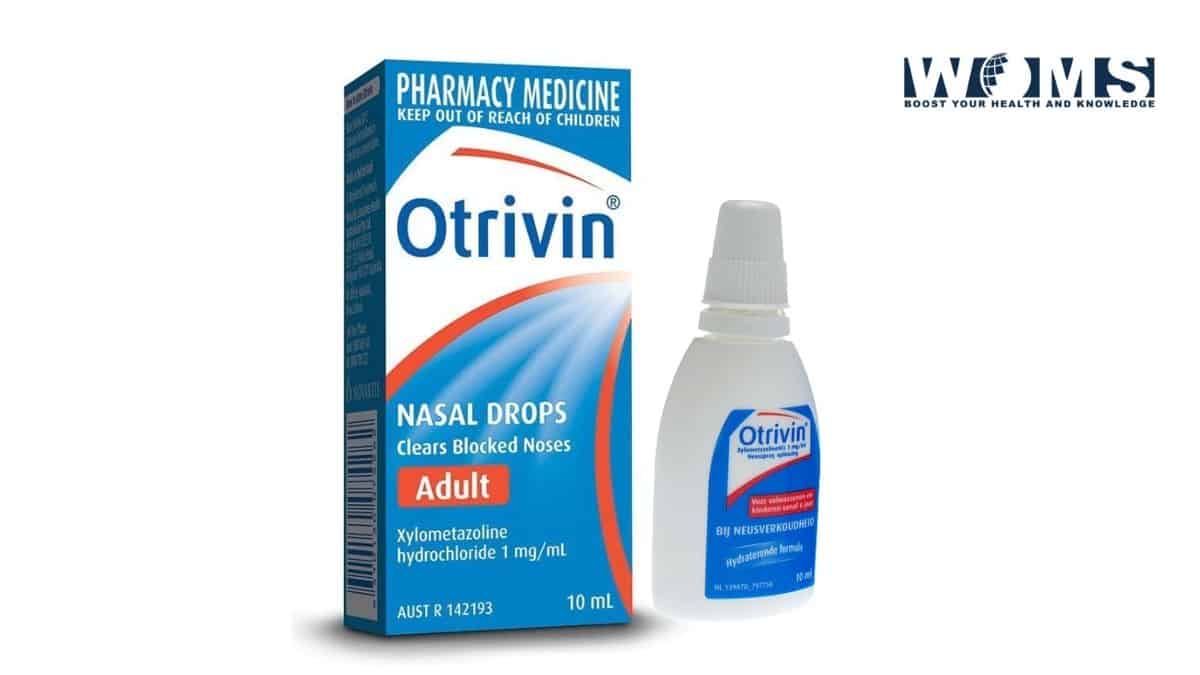Otrivin Nasal Drop

What is Otrivin?
Otrivin is a nasal spray that is used to temporarily relieve congestion of the nose caused by common cold, rhinitis, sinusitis, air pollution, and various type of allergies. Nasal congestion can cause discomfort, difficulty in falling asleep and can impair hearing.
Otrivin performs its action by constricting the blood vessels in the nose. In this way, it reduces swelling and congestion. It is a clear, colorless, and odorless solution. It is generally well-tolerated and has no effect on the ciliated epithelium of the nasal area.
Active ingredient
Xylometazoline hydrochloride
Otrivin nasal drops also contain purified water, monosodium phosphate, disodium phosphate, levomenthol, ethanol, cetrimide, methyl hydroxybenzoate, camphor
Formulations
- OtrivinNasal Spray 0.05%
- Otrivin Nose Drops 0.1%
Duration of action
Provides relief in 2 hours and its effect lasts for 12 hours.
Size
Size of container is 10 ml.
Uses of otrivin spray
Otrivin nasal drops are used to constrict blood vessels and decongest nasal blood vessels to provide ease to patients in breathing through the nose. Congestion is caused by swelling of the nasal passages.
- It provides relief from nasal congestion.
- It can also be used to reduce swelling in the nose area before performing any surgery.
- In otitis media (ear infection) to decongest the nasopharyngeal mucosa.
- Before rhinoscopy
Dosage
In adults
- 1 puff into one nostril at a time
- 2-3 puffs in a day (every 8 to 10 hours)
Pediatric dose: (children above 6 years)
- 2 to 3 puffs in each nostril after every 12 hours.
- Do not exceed 2 doses in 24 hours.
- Always use with adult supervision.
Directions to use otrivin nasal spray
- Carefully read the leaflet that comes with the spray and follow the directions to use specified on the leaflet.
- Use the otrivin spray as directed by your physician. For any queries, contact your doctor.
- Shake well before use.
- Clean your nose thoroughly before using the medication.
- Before using the spray, blow your nose gently. Close the nostril that is not receiving the medication by pressing with your finger.
- Tilt your head back while lying down.
- Use the otrivin nasal spray in the nostril not pressed by the finger. Whiff hard for a few seconds to make sure that the medication reaches deep into your nose.
- Repeat the same procedure for the other nostril.
- After spraying, rinse the tip of the spray or clean with a wet cloth.
- Replace the cap after use.
Side Effects of Otrivin nasal drops
Common side effects of otrivin which do not require medical attention are:
- Dryness of nose and throat
- Headache
- Temporary burning
- Stinging in nose
- Sneezing
- Runny nose
- Nausea
Rare side effects experienced only by a few people:
- Sleeping problems
- Bleeding from nose
- Allergic reactions
- Blurred vision
- Irregular heartbeat
- Chest pain
- Anxiety and confusion
- Trembling
Stop using the otrivin nasal spray if you notice any of the following symptoms:
- Shortness of breath or difficult breathing
- Swelling of face and neck
If any of these symptoms worsen, remember to contact your doctor and let him know promptly.
How to manage side effects
1. Headache
Ensure plenty intake of water and take proper rest. Consult your physician to prescribe you a painkiller if the headache is severe.
2. Nausea
Drink plenty of water to avoid dehydration. Do not take an antiemetic without consulting your doctor.
Precautions
- Do not let water enter the otrivin spray bottle while cleaning the tip.
- Check the seal is not broken before use. If it is broken, do not use the medication.
- Keep out of the reach of children and pets. Before using the nasal spray in children, consult with your doctor whether it is safe to use or not.
- Do not share this medication with other people as using the same container by two or more people can result in the spread of infection.
- Store in a cool and dry place.
- Do not touch the tip of the spray bottle and avoid touching the dropper tip to any other surface to avoid any risk of contamination.
- Wash your hands before using the otrivin nasal drops.
- Avoid deep breathing to prevent the medication from going into your throat.
- Do not ingest the medication if it comes down into your throat. Instead, spit it out.
- Use the medication according to the doctor’s instructions. Do not increase the dosage or frequency as it can result in aggravation of side effects.
- Avoid standing up or sneezing for a few minutes after you use otrivin drops.
- Do not use otrivin drops after the expiry date and discard the medication properly.
- Avoid contact with the eyes.
- Do not cut the nozzle.
- Do not exceed the recommended dose in one day, especially in children and in old age people. Excessive use of otrivin can damage the ciliated epithelium of the nasal mucosa.
Contraindications for use of otrivin
Always inform your doctor if you suffer from any of the medical conditions listed below:
- Allergic reactions to the product or any other type of allergies
- Heart and blood vessel disease: Otrivin acts on the receptors in the heart and causes positive chronotropic and ionotropic effects, i.e., it increases cardiac output, oxygen consumption, and workload.
- Hyperthyroidism
- Hypertension
- Atrophic Rhinitis
- Pheochromocytoma
- Prolonged QT Interval: Patients have prolonged QT interval on ECG can be at increased risk for developing ventricular and supraventricular arrhythmias. So otrivin nasal drops should be used cautiously or not used at all in such types of patients. Consult your doctor so that he/she can prescribe you an alternative to this medication.
- Diabetes: Otrivin can cause an increase in blood sugar levels. Always inform your doctor before starting with this medication.
- Difficulty in urination due to the enlarged prostate gland: Using otrivin in case of prostatic hyperplasia can worsen the condition. It causes contraction of the smooth muscles in the neck of the bladder via stimulation of alpha-1 adrenergic receptors.
- Narrow-angle glaucoma: The use of otrivin can worsen narrow-angle glaucoma.
- If you are undergoing any surgery: Avoid using the otrivin nasal spray or nasal drops if you have undergone trans-nasal surgery or about to undergo surgery.
- If you are pregnant or planning a pregnancy: The FDA pregnancy category is not assigned. Animal studies have not been conducted but there can be a potential risk if taken in pregnancy. So always remember to inform your doctor if you are pregnant or plan to become pregnant.
It is generally not advisable to not use otrivin nasal spray in pregnancy due to its systemic vasoconstrictor effects which can be potentially dangerous for both the mother and the baby. - In children under 12 years of age: In children younger than 12 years of age, it is not considered safe to use. So otrivin nasal spray or nasal drops should not be used in children.
- Breastfeeding: There is no clinical evidence of whether this medication passes into the breast milk but always consult your doctor before using the medication)
Interactions of otrivin with other medications
If you are taking any prescription or non-prescription medications, inform your doctor beforehand so that he/she can prescribe you accordingly. Do not adjust the dosage or stop any medications by yourself before checking with your doctor.
Otrivin nasal drops may interact with other medications listed below:
- MAO inhibitors (such as selegiline, phenelzine, isocarboxazid, procarbazine, tranylcypromine): Stop taking MAO inhibitors for two weeks before starting otrivin nasal drops. They can cause fatal drug interactions.
- Linezolid
- High blood pressure medications
- Tricyclic antidepressants(such as amitriptyline)
- Cough and cold medications
- Ergot medications (such as ergotamine, ergonovine)
- Alpha-blockers (such as doxazosin, tamsulosin, alfuzosin)
- Bromocriptine
- Caffeine
- Amphetamines (such as dextroamphetamine, lisdexamfetamine)
- Fentanyl
- Norepinephrine
- Theophyllines (such as aminophylline, oxtriphylline, theophylline
- Methylphenidate
- Cannabis-containing drugs (such as cannabis, dronabinol, nabilone)
If you are taking any of these drugs, your doctor might stop them, prescribe an alternative to the medicine, adjust the dosage or make no changes at all.
When to contact your doctor
Your doctor may prescribe you otrivin nasal drops in the view that their benefits are greater than the risk of side effects. However, inform your doctor if you notice any of the following symptoms or if the side effects worsen:
- Headache
- Dizziness
- Slow, pounding heartbeat
- Nausea
- Sleeping problems
- Tremors/ shaking
- Sweating
- Mood changes
- Allergic reaction; though rare, but it can be alarming. Remember to inform your doctor if you notice any symptoms of allergy such as rash, itching, swelling, or redness.
Overdosage
If someone has overdosed on the medication, contact your doctor as soon as possible or the poison control center.
Overdosage means that drug is used much more frequently than your doctor prescribed or it is used in higher doses than recommended.
Symptoms of overdose include:
- Dizziness
- Loss of consciousness
- Slow, pounding heartbeat
- Drowsiness
- Impaired breathing
- Hypertension followed by hypotension
- Hypothermia (lowered body temperature)
- Respiratory depression
- Convulsions
- Coma
Extended use of otrivin can lead to drug dependence, but it is different from drug addiction. Physical dependence means that when you skip a drug dose, it results in withdrawal symptoms, such as rebound congestion.
Otrivin also has the ability to develop tolerance. Tolerance means that you now require greater and more frequent doses to achieve the desired drug effects.
Other forms of otrivin
1. Otrivin oxy
Otrivin oxy provides faster and long-lasting relief from blocked and stuffy nose. It effectively reduces congestion in the nose in about 25 seconds and works for 12 hours. The active ingredient is oxymetazoline.
It is recommended for adults and children above 12 years of age.
2. Otrivin naturals
Otrivin naturals is made with sterile seawater and sea salt solutions. It gently improves nasal breathing with help of concentrated salt solutions. The concentrated solutions help draw out excess mucus.
3. Otrivin Extra Dual relief nasal spray
This is a combination medication consisting of two products; xylometazoline hydrochloride and ipratropium bromide.
Xylometazoline hydrochloride has a decongesting effect whereas the latter product helps cure the runny nose.
4. Otrivin Breathe Clean
Otrivin breathe clean comprises of isotonic sea salt solutions and natural glycerine. It decongests the nasal area in colds and allergies and washes away all the impurities and germs. Glycerin helps in moisturizing the nose. It can be used in children above 2 years of age.
Frequently asked questions
How does otrivin work?
The active agent in otrivin nasal spray is xylometazoline. This constricts the blood vessels in the nasal mucosa and reduces swelling and redness.
How to dispose of the medication?
When disposing of the medication, discard the product properly. Do not flush or pour it into the drain until instructed. Contact your physician or local waste disposal company for instructions on how to safely discard the product.
For how long can I use otrivin nasal drops?
You cannot use this medication for more than 3 days. Using it for a longer period can result in a condition called rebound congestion. Rebound congestion is characterized by an increased severity of runny nose. Redness and swelling inside the nose for an extended period can also be seen. Consult your doctor if this condition occurs.
Is this medication safe to use in children?
Use of otrivin nasal drops is not recommended in children less than 6 years of age. However, a special formula for children is available called the otrivin pediatric drops.
What happens if I use this medication for a long time?
Using this medication for more than 10 days can result in a condition called rhinitis medicamentosa. It is a type of rebound congestion that involves redness and swelling inside the nose for an extended period of time. Patients tend to increase the frequency and dose of the nasal spray which further worsens the condition.
Can I use otrivin oxy as ear drops?
Otrivin oxy can only be used in the nasal passage to cure nasal congestion. There is no medical evidence available for its use in ear problems.
How should I store otrivin nasal sprays?
Store the nasal spray in a cool and dry place with a temperature, not more than 25 degrees Celsius. Do not freeze.
What if I miss a dose?
If you miss a dose, take it as soon as you remember. But if it’s time for the next dose, skip the missed one. Do not take a double dose to make up for the missed dose.
Do I need a prescription for otrivin?
Otrivin is available as an over-the-counter medication without any prescription by the doctor.
Does the use of otrivin nasal spray impair nasal function?
No, the use of this nasal spray does not impair your mucociliary function.
Can Otrivin nasal drops be used by the systemic route?
No, these nasal drops cannot be used by the systemic route. Nasal administration is the only safe route of administration.
What is the shelf life of otrivin?
It can be stored for 2 years (24 months) without opening the container. If the container is opened, it should be used within 28 days. Discard the medication properly after 28 days and do not use.
How to get rid of dependency of the drug?
To get rid of the dependency of otrivin nasal drops, gradually taper the dose. Cut off the use in a methodical way, it can be even one nostril at a time.




